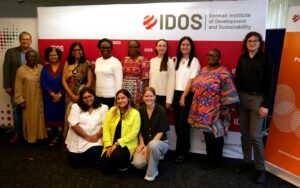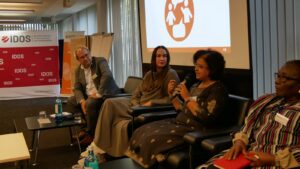
What are local feminist perspectives and what kind of alternative approaches to development processes can they offer to target prevailing norms and practices preventing gender equality? In the research project “Local feminist perspectives as transformation levers towards more gender equality”, colleagues at IDOS, Stephan Klingebiel and Jacqueline Götze and at three partner organisations from Ghana, India and Ukraine are dealing with these questions to contribute to a better understanding of local feminist perspectives and how they can be used as transformation levers for gender equality. Why are Ghana, India and Ukraine interesting cases to analyse local feminist perspectives as transformation levers? All these contexts stand for different types of gender (in)equalities, represent different world regions, civil society landscapes as well as socio-political and socio-economic situations. Despite these differences, there are also common challenges and trends that are influencing the work for women’s and other marginalised gender’s rights.
After almost a year of working together, the project has achieved several milestones yet, with all teams working on a study on local feminist perspectives in the respective context and the IDOS team on a study that synthesises the partners’ contributions against the background of broader debates in feminist scholarship on development and foreign policies. Furthermore, the project has organised virtual kick-off workshops and interim workshops in summer in Bonn, Accra and India as well as a joint workshop in October in Bonn where preliminary findings were shared among the teams as well as with a wider group of interested colleagues. For this occasion, all teams from Gender in Detail (Ukraine), the Gender Studies and Human Rights Documentation Centre (Ghana) and the Goa Institute of Management (India) presented their insights and findings to the informed audience. The Ukrainian team presented their analysis of the significant role of feminist perspectives in fostering sustainable gender-transformative changes within Ukraine, particularly during the ongoing defence against Russian aggression. The study finds that despite the challenges of war, feminist activists continue to push for more transformative policies addressing immediate wartime needs but also broader questions of gender-sensitive defence and inclusive post-war recovery. The Ghanaian study analyses local feminist perspectives in Ghana and shows that gender inequality occurs in both formal and informal spaces. They deduce feminist strategies that worked towards more gender-transformative policies with awareness-raising and lobbying activities or reviewing of content for policies and laws. The Indian study focuses on the areas of women’s health and climate action in India. They follow an intersectional framework (with four different layers being the individual, the household and community, the institutional structure and policy interventions) and propose strategies for transformational change based on collaboration. Although the regional and thematic foci vary between the three cases, all three presentations highlighted the role of gender norms emanating from patriarchy which links their work to debates and discussion in feminist scholarship on the relevance of norms to understand gender (in)equalities.

In the second half of the semi-public event in October in Bonn, a roundtable discussion was facilitated that allowed to dive deeper into some key questions all three studies dealt with. The roundtable participants, Tamara Zlobina (Gender in Detail), Sreerupa Sengupta (Goa Institute of Management) and Dorcas Coker-Appiah (Gender Studies and Human Rights Documentation Centre) discussed the differences between feminist actions on the behavioural and structural level, the pros and cons of gender mainstreaming approaches pushed forward by states as well as so-called sticky norms that prevent more gender-transformative policies and implementations in each context. In view of feminist foreign and development policy approaches, colleagues formulated a call to base these approaches more on human rights and solidarity and less on economic and geopolitical considerations pointing to an interrelation between patriarchy, capitalism and colonialism. Colleagues expressed the need to build feminist transnational alliances and collaboration to create new discourses given shared visions of a better future and similar challenges in achieving them. Colleagues suggested creating better narratives for gender equality and working on the documentation of strategies that were successful in pushing for feminist agendas to share them among each other.
The research project “Local feminist perspectives as transformation levers for greater gender equality” is funded by GIZ and IDOS. For more information, please consider the project’s homepage: https://www.idos-research.de/en/research/description/details/local-feminist-perspectives-as-transformation-levers-for-greater-gender-equality/. All four studies are planned to be published in spring next year. All contributions are going to be discussed during a synthesis conference on 19 March 2025 in Berlin.

Schreibe einen Kommentar